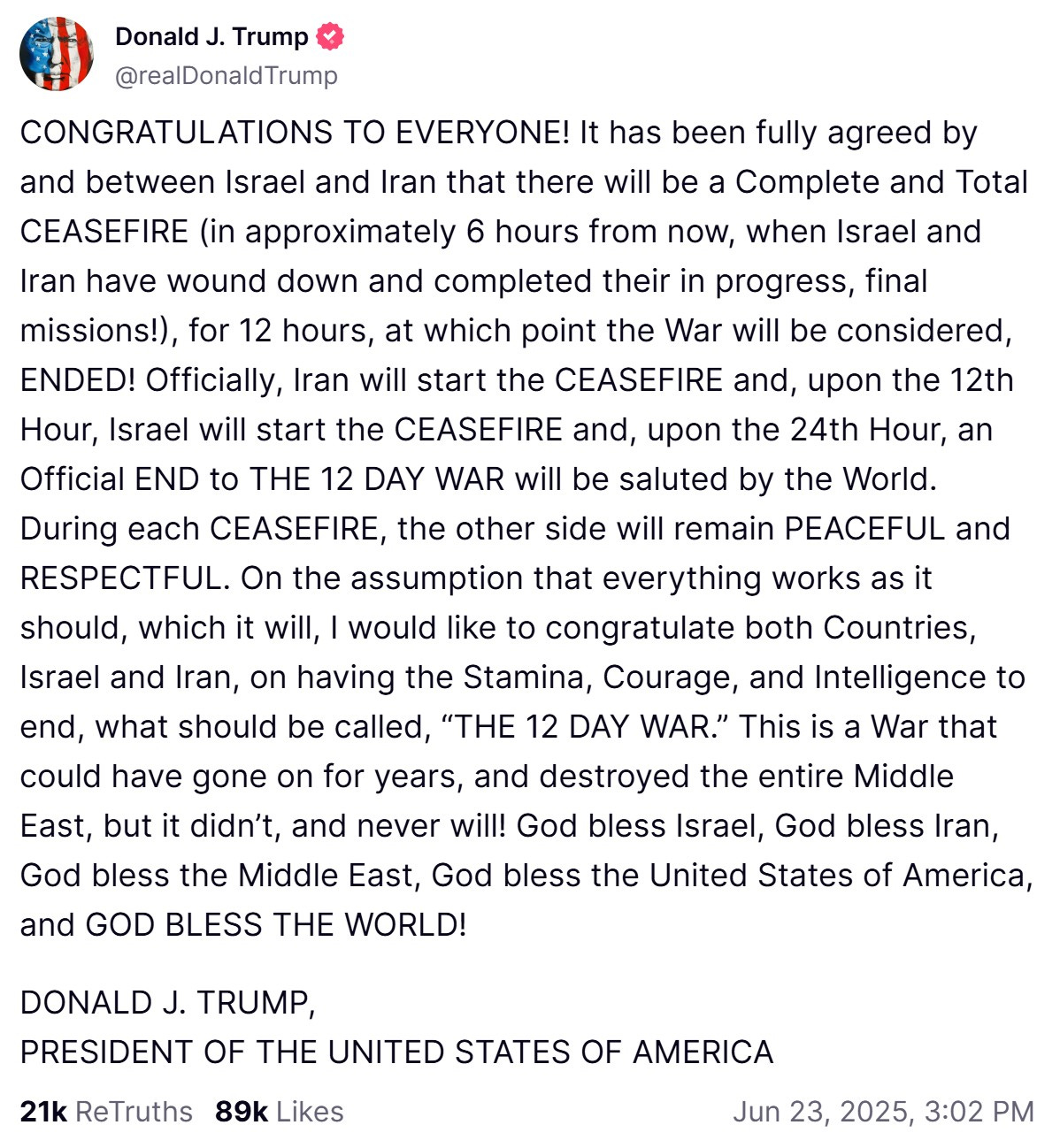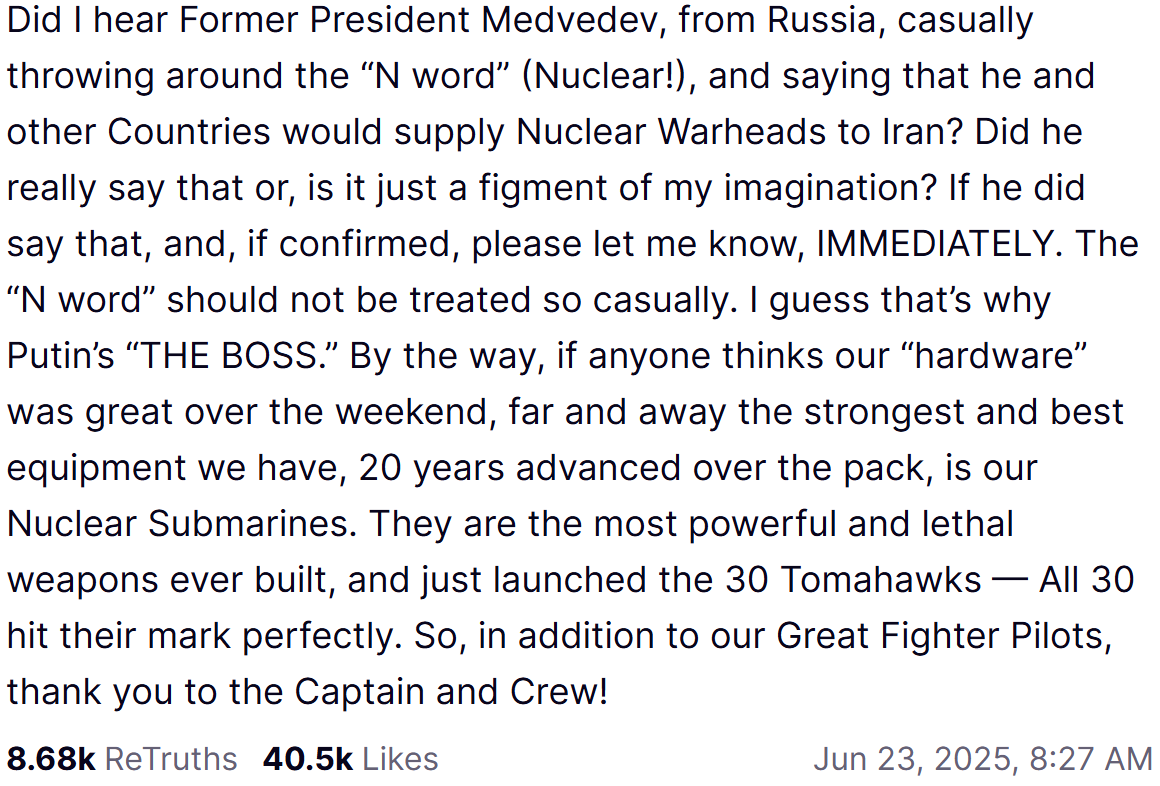Donald Trump’s Truth Social post announcing a “Complete and Total CEASEFIRE” between Israel and Iran is undermined not only by its grandiose tone and superficial framing but also by conflicting reports from within the Iranian government that cast serious doubt on the validity of the announcement. While Trump declared that both nations had agreed to a staged cessation of hostilities culminating in a formal end to what he dubbed “THE 12 DAY WAR,” an Iranian official told CNN that no ceasefire proposal had been received from the United States and that Tehran saw “no reason” to halt its military campaign. Instead, the Iranian official dismissed Trump’s announcement as “deception” aimed at justifying further U.S. and Israeli aggression, stating that Iran was preparing to escalate retaliatory strikes, not stand down.
This stark contradiction makes Trump’s declaration appear dangerously premature at best and outright misleading at worst. He not only exaggerated the status of negotiations but appeared to project certainty where none existed, touting a “saluted” global end to hostilities based solely on his own timeline. The disconnect is further exacerbated by Prime Minister Netanyahu's directive to his ministers to refrain from public comment, suggesting that Israel, too, had not finalized or fully endorsed the ceasefire terms at the time of Trump’s post. While Qatari mediation reportedly played a role in ongoing discussions, and Israeli officials indicated an intention to conclude military operations soon, there is no independent verification that Iran consented to any ceasefire agreement.
Trump’s messaging, drenched in capital letters, emotional platitudes, and sweeping claims about “Stamina, Courage, and Intelligence,” fails to acknowledge the complexity of the situation or the reality that one party outright denies the agreement’s existence. His post reads more like campaign theater than an official statement grounded in diplomacy. Rather than signaling peace, it raises serious questions about the Trump administration’s grasp of facts during a volatile moment in Middle Eastern geopolitics. The potential fallout from misrepresenting the state of war and peace between Israel and Iran could be profound—strategically, diplomatically, and morally.
Sources: Truth Social, The Jerusalem Post
Donald Trump issued a Truth Social post that is reckless, unserious, and deeply inappropriate given the subject matter — nuclear proliferation and military escalation. His flippant use of the phrase “the ‘N word’ (Nuclear!)” trivializes the catastrophic stakes of nuclear weapons policy by reducing it to a crude rhetorical gimmick. Rather than showing the caution and gravitas demanded of a president addressing potential threats involving weapons of mass destruction, Trump turns the issue into a dramatic punchline designed to provoke and entertain his base. Worse, he does so without confirming whether Dmitry Medvedev, Deputy Chairman of the Security Council of Russia, actually made the statement in question, instead relying on hearsay and insinuation to stoke panic and reinforce his own narrative of global chaos, which he claims only he can manage.
Trump’s offhand remark that “Putin’s THE BOSS” is more than just tone-deaf — it’s an implicit endorsement of authoritarian power in the midst of a delicate international crisis. In praising a dictator who regularly threatens U.S. interests, Trump undercuts American diplomatic credibility and signals submissiveness at a time when clarity and resolve are required. The latter half of the post, in which he brags about the capabilities of U.S. nuclear submarines and boasts that “All 30 hit their mark perfectly,” is equally disturbing. Trump displays no interest in the consequences of such strikes, the legality of their execution, or their geopolitical fallout. Instead, he reduces military action to a show of force meant to awe and impress, as if lives and global stability are secondary to performance metrics.
Overall, the post is an alarming glimpse into a president who views nuclear diplomacy as a stage for self-promotion, disinformation, and adolescent swagger. It lacks moral seriousness, strategic thought, or any semblance of responsible leadership.
White House Press Secretary Karoline Leavitt’s appearance on Fox & Friends offered a triumphalist defense of President Trump’s military strike on Iranian nuclear sites, but it was riddled with exaggeration, deflection, and a concerning level of bravado for a moment with serious global implications. Leavitt praised the strike as an unprecedented act of courage and success, framing Trump as the only president with the "guts" to neutralize Iran’s nuclear ambitions. This oversimplifies decades of diplomacy and international monitoring that have aimed—often successfully—to constrain Iran's nuclear program without triggering open conflict. Her assertion that the “whole world should be pleased” ignores the widespread concern among U.S. allies and international watchdogs about the escalation risk such unilateral action presents. Leavitt's claim that the attack “prevented a nuclear conflict” is speculative at best and irresponsibly dismisses the potential for retaliation.
Throughout the interview, Leavitt relied on political theater rather than measured analysis. She framed the operation as a fulfillment of Trump’s personal doctrine of “peace through strength,” disregarding the fact that similar language has been used by past administrations, including Reagan’s. Her dismissal of dissenting voices on the right—such as Steve Bannon and Marjorie Taylor Greene—as irrelevant to Trump’s decision-making also reveals a worrying indifference to intra-party debate over war powers and national security. Furthermore, Leavitt’s answer to a question about potential sleeper cell retaliation devolved into a generic border enforcement talking point, offering no new information or specificity. She invoked mass deportations and blamed Joe Biden for alleged terrorist infiltration, shifting the discussion away from the Iran strike’s real-world consequences and onto a familiar Trump-era political script.
When asked about the lack of congressional consultation, Leavitt insisted that Democratic leaders had been briefed, accusing critics like Rep. Thomas Massie of spreading misinformation and aligning with Democrats. Her defense amounted to partisan finger-pointing rather than a serious engagement with concerns about constitutional war powers or transparency. The invocation of Obama’s 2011 Libya strikes as a precedent ignored the broader criticism that both administrations skirted Congress, further muddying the legal justification for Trump’s actions. Finally, her discussion of NATO was vague and hawkish, with a sudden demand for allies to spend 5% of their GDP on defense—more than double the long-standing 2% benchmark—delivered without explanation or acknowledgment of allied concerns over Trump’s erratic foreign policy.
Overall, Leavitt’s performance substituted sound bites for strategic thinking. She portrayed the Iran operation as a singular act of heroism while ignoring both legal scrutiny and the long-term implications of provoking a volatile adversary. Her framing of events blurred the line between propaganda and policy communication, underscoring the administration’s continued preference for showmanship over substance in matters of war and diplomacy.
The Supreme Court ruled Monday to temporarily allow the Trump administration to proceed with deporting certain immigrants to countries not listed in their original removal orders, halting a lower court’s order that had blocked such transfers without procedural safeguards. The case centers on a Department of Homeland Security policy implementing President Trump’s executive order to expedite deportations, including to so-called "third-party countries."
Earlier this year, DHS began evaluating whether immigrants—who could not be returned to their home countries due to the risk of torture—could instead be removed to other nations. In March, DHS issued new guidelines requiring that immigrants receive notice, an opportunity to express fear of torture, and a screening process before any such deportation.
Four undocumented immigrants challenged the policy in Massachusetts, where U.S. District Judge Brian Murphy ruled that DHS must first provide notice and a fair process before third-country removals. He temporarily barred these deportations unless the government provided immigrants and their lawyers with at least 10 days’ notice, conducted a “reasonable fear” assessment, and allowed 15 days to seek to reopen their immigration cases.
After a federal appeals court refused to suspend Murphy’s ruling, the Trump administration appealed to the Supreme Court, arguing that the lower court’s requirements disrupted foreign policy and national security. The government cited its failed attempt to deport immigrants to South Sudan—an active conflict zone—as evidence of operational difficulties.
In a brief, unsigned order, the Court granted the Trump administration’s request, pausing Murphy’s order while litigation continues. At least five justices supported the decision, though no reasoning was provided.
Justice Sonia Sotomayor, joined by Justices Kagan and Jackson, dissented sharply. She accused the government of defying court orders, including by unlawfully deporting immigrants to El Salvador and South Sudan, and argued that the Court was rewarding executive branch misconduct. She criticized the majority for intervening prematurely in “high-stakes litigation” and warned that enabling government noncompliance undermines the rule of law and judicial authority.
The Trump administration has issued a final rule that significantly alters the Affordable Care Act, reversing several policies enacted during the Biden administration. One major change is the shortening of the annual open enrollment period for federal health insurance exchanges, which will now run from November 1 to December 31, instead of ending on January 15. States with their own exchanges may set different enrollment periods, but they cannot exceed nine weeks within that timeframe. In addition, the administration is ending ACA coverage for immigrants who entered the U.S. illegally as children, known as “Dreamers,” undoing a Biden-era policy that could have allowed approximately 147,000 individuals to enroll. This provision had already been blocked in 19 states and remains under litigation.
Another controversial provision bans ACA plans from covering gender-affirming care, labeled by the administration as “sex-trait modification,” starting in the 2026 plan year. This restriction will apply to states that currently cover such services as well as those that do not. The rule also increases income verification requirements for individuals enrolling through federal exchanges and imposes a $5 monthly premium on auto-enrolled consumers until they confirm or update their eligibility. Additionally, it eliminates the monthly special enrollment period for individuals earning below 150 percent of the federal poverty line, which the administration claims has been exploited for fraudulent enrollment or unauthorized plan changes.
While many of these changes will last only one year, the administration has positioned this limited duration to give congressional Republicans time to codify the rules into permanent law. The projected savings—estimated at up to $12 billion in 2026—are expected to help fund a major GOP tax and spending bill. The administration argues that these reforms are necessary to reduce wasteful spending and ensure that the ACA marketplaces remain affordable and sustainable for working American families.





